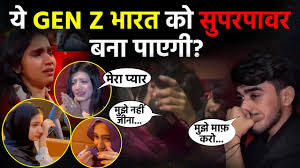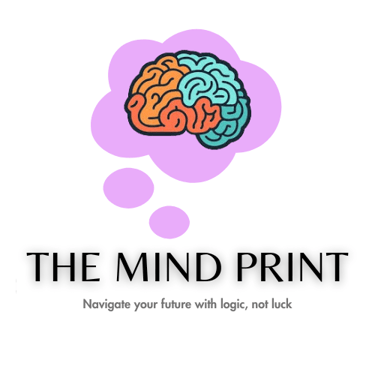The "Saiyaara" Effect: Is Emotional Openness a Weakness?
There's a buzz in the air, a familiar rhythm of discussions around Gen Z. On one hand, we see social media alight with "nibbas" and "nibbis" (a playful, sometimes derisive term for young, overly emotional individuals) shedding tears over romantic dramas like "Saiyaara." On the other, the news showcases young innovators, fresh out of college, launching ventures and spearheading innovations that promise to reshape our future. It begs the question: What's truly going on with Gen Z? Is there a contradiction, or is it a nuanced reflection of a generation that's far more complex than meets the eye? Let's dive in.
Himanshu Sharma ( Career Coach ; Youth Empowerment )
7/23/20253 min read


The "Saiyaara" Effect: Is Emotional Openness a Weakness?
The recent release of "Saiyaara," a film reportedly drawing comparisons to emotional Korean dramas, has ignited conversations about Gen Z's emotional responses. Why are these films hitting so hard? And is it "wrong" to be so openly emotional?
Firstly, it's crucial to understand that Gen Z has grown up in a world of unprecedented access to information and a digital culture that normalizes sharing. Social media, for all its flaws, has created spaces where expressing vulnerabilities, anxieties, and even heartbreak is not just accepted but often celebrated. The idea of "toughening up" or suppressing emotions, prevalent in older generations, is increasingly being challenged.
When Gen Z watches a film like "Saiyaara," they're not just consuming a story; they're experiencing a reflection of their own emotional realities. The anxieties around relationships, the pain of loss, and the intensity of young love resonate deeply in a generation that is perhaps more attuned to their inner worlds than any before.
Is it a weakness to cry? Absolutely not. Emotional expression is a fundamental human trait. It's a sign of empathy, of connection, and of processing experiences. If a movie evokes genuine tears, it means it has touched a part of your humanity. To label such a response as "nibba nibbi" crying is to dismiss valid emotional experiences and perpetuate a harmful stereotype that discourages authentic feelings.
In fact, many mental health experts laud Gen Z's openness about their emotions. It's a step towards destigmatizing mental health issues and fostering a more empathetic society. They are leading the way in showing that it's okay to "not be okay" and to seek support when needed.
The Other Side of the Coin: Innovation and Progressive Approaches
But the narrative doesn't end with emotional depth. Simultaneously, we witness the incredible drive and entrepreneurial spirit of Gen Z. Young people are not just passively consuming content; they are actively creating, innovating, and driving change.
In India, for instance, initiatives like the College Youth Ideathon 2025 and the Industrial Ideathon 2025 are actively fostering a "job-creator's mindset" among students. We see young minds developing solutions in diverse sectors, from sustainable energy and healthcare tech to e-commerce and digital transformation.
This generation is pragmatic and analytical. They are deeply concerned about global issues like climate change and economic instability. These concerns, far from making them passive, fuel their desire to innovate and build a better future. They are leveraging technology not just for entertainment, but for impactful solutions, often with a strong focus on sustainability and social responsibility.
They are less afraid of failure and more willing to experiment. The fast-paced, iterative nature of the digital world has ingrained in them a resilience and adaptability that is crucial for entrepreneurship. They are not waiting for opportunities; they are creating them.
The Interconnectedness of Emotions and Drive
So, are these two sides of Gen Z a contradiction? Not at all. They are intrinsically linked.
A generation that is comfortable acknowledging and processing its emotions is also a generation that is more resilient. They understand the importance of well-being, both personal and collective. This emotional intelligence, far from hindering their progress, can actually fuel it.
Empathy drives innovation: Understanding human needs and struggles, often through personal emotional experiences, can be a powerful motivator for creating solutions that truly matter.
Resilience through vulnerability: Learning to navigate emotional challenges makes them more adaptable and persistent in the face of entrepreneurial hurdles.
Authenticity in leadership: Gen Z's emphasis on authenticity extends to their professional lives. They seek purpose-driven work and are more likely to build ventures that align with their values, fostering a more ethical and sustainable future.
The "nibba nibbi" crying over "Saiyaara" might also be the brilliant mind sketching out a sustainable urban farming solution or coding the next big AI application. Their tears are not a sign of weakness, but a testament to their capacity for deep feeling, a capacity that often goes hand-in-hand with their drive to make a meaningful impact on the world.
Let's move beyond simplistic labels and embrace the multifaceted reality of Gen Z – a generation that feels deeply, thinks critically, and is poised to reshape our world with both their hearts and their minds.
#GenZ #EmotionalIntelligence #Innovation #YouthEmpowerment #SaiyaaraEffect #ProgressiveYouth #FutureLeaders #MentalWellness #Entrepreneurship #BeyondStereotypes #HimanshuSharma #TheMindPrint
Connect with The Mind Print
himanshu.sharma@themindprint.in
9012335561
The Mind Print
3rd Floor, Sukhshant Complex
Mangal Pandey Nagar, Opp Sales Tax Office
Meerut, U.P 250004

Unsure About Your Career? Mind Print Can Help!
Choosing the right academic path is a crucial decision that can shape your entire career. At The Mind Print, we understand the pressure and confusion students face when selecting a stream and college. That's why we offer expert career counseling sessions to guide you towards a fulfilling future.
Why Choose Mind Print's Career Counselling?
Experienced Professionals: Our team comprises seasoned career counsellors who possess in-depth knowledge of various educational streams, career options, and entrance exams.
Personalized Guidance: We go beyond a generic approach. Our sessions are tailored to your individual strengths, interests, and aspirations.
Data-Driven Insights: We leverage statistics to provide you with a clear picture of competitive exams and college admissions.
The Numbers Speak for Themselves
Highly Competitive Exams:
CUET (Common University Entrance Test): With lakhs of students appearing for a limited number of seats, especially in top universities, strategic preparation holds the key to success.
NEET & IIT JEE (Engineering Entrance Exams): The acceptance rate for these prestigious exams is incredibly low, making expert guidance invaluable.
CAT (MBA Entrance Exam): Cracking this exam requires a focused approach and understanding of your strengths and weaknesses in management skills.
Limited Seats in Reputed Government Colleges: Many government colleges have a limited number of seats, making informed college selection crucial.
Don't Let Statistics Discourage You!
The Mind Print's career counselling empowers you to navigate the complexities of entrance exams and college admissions. We help you:
Identify your strengths and interests
Explore suitable academic streams
Develop a study plan for competitive exams
Choose the right colleges based on your aspirations and entrance exam scores
Take Charge of Your Future
Don't let uncertainty cloud your future. Schedule a career counselling session with Mindprint today! Together, we can create a roadmap to your dream career.
Contact us to learn more!
Additionally, consider including a call to action button that directs students to book a counselling session or explore available resources on your website.
